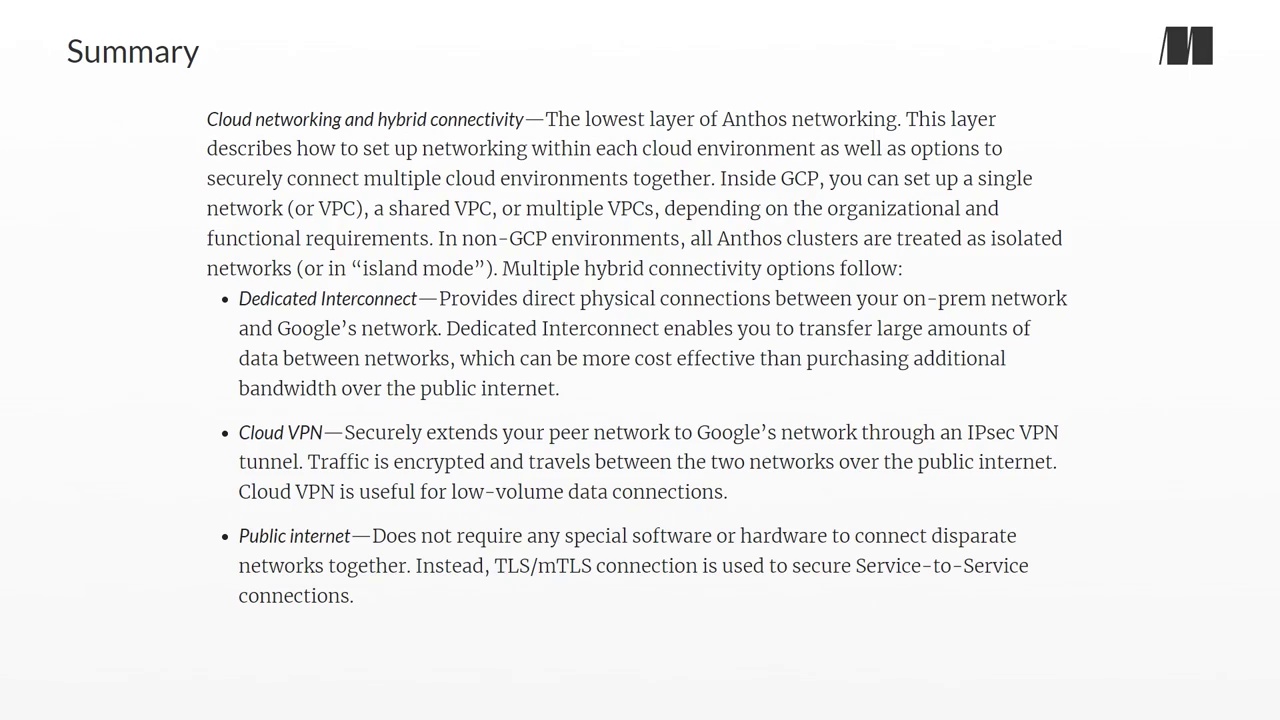001. Chapter 1. Overview of Anthos
002. Chapter 1. Origins in Google
003. Chapter 1. Summary
004. Chapter 2. One single pane of glass
005. Chapter 2. Non-Anthos visibility and interaction
006. Chapter 2. The Anthos UI
007. Chapter 2. The Anthos Cloud UI
008. Chapter 2. Monitoring and logging
009. Chapter 2. GKE dashboard
010. Chapter 2. Connecting to a remote cluster
011. Chapter 2. Summary
012. Chapter 3. Computing environment built on Kubernetes
013. Chapter 3. Kubernetes architecture
014. Chapter 3. Advanced topics
015. Chapter 3. Examples and case studies
016. Chapter 3. Summary
017. Chapter 4. Anthos Service Mesh Security and observability at scale
018. Chapter 4. What is a service mesh
019. Chapter 4. An introduction to Istio
020. Chapter 4. What is Anthos Service Mesh
021. Chapter 4. Installing ASM
022. Chapter 4. Conclusion
023. Chapter 4. Examples and case studies
024. Chapter 4. Summary
025. Chapter 5. Operations management
026. Chapter 5. Anthos command-line management
027. Chapter 5. Anthos attached clusters
028. Chapter 5. Anthos on bare metal
029. Chapter 5. Connect gateway
030. Chapter 5. Anthos on Azure
031. Chapter 5. Summary
032. Chapter 6. Bringing it all together
033. Chapter 6. Application deployment
034. Chapter 6. Policy enforcement
035. Chapter 6. Service management
036. Chapter 6. Summary
037. Chapter 7. Hybrid applications
038. Chapter 7. Geographically distributed applications
039. Chapter 7. Hybrid multicloud applications with internet access
040. Chapter 7. Applications regulated by law
041. Chapter 7. Applications that must run on the edge
042. Chapter 7. Summary
043. Chapter 8. Working at the edge and the telco world
044. Chapter 8. New edge applications
045. Chapter 8. Anthos as a platform for edge and telco workloads
046. Chapter 8. Summary
047. Chapter 9. Serverless compute engine (Knative)
048. Chapter 9. Knative
049. Chapter 9. Knative architecture
050. Chapter 9. Summary
051. Chapter 10. Networking environment
052. Chapter 10. Anthos GKE networking
053. Chapter 10. Anthos multicluster networking
054. Chapter 10. Services and client connectivity
055. Chapter 10. Summary
056. Chapter 11. Config Management architecture
057. Chapter 11. Overview of ACM
058. Chapter 11. Examples and case studies
059. Chapter 11. Conclusions
060. Chapter 11. Summary
061. Chapter 12. Integrations with CICD
062. Chapter 12. Continuous delivery vs. continuous deployment
063. Chapter 12. Continuous development
064. Chapter 12. Continuous integration
065. Chapter 12. Continuous deployment with Cloud Deploy
066. Chapter 12. Modern CICD platform
067. Chapter 12. Summary
068. Chapter 13. Security and policies
069. Chapter 13. Hypervisors vs. container runtimes
070. Chapter 13. Kubernetes security overview
071. Chapter 13. Common security concerns
072. Chapter 13. Understanding container scanning
073. Chapter 13. Understanding container security
074. Chapter 13. Using ACM to secure your service mesh
075. Chapter 13. Conclusion
076. Chapter 13. Examples and case study
077. Chapter 13. Summary
078. Chapter 14. Marketplace
079. Chapter 14. Real-world scenarios
080. Chapter 14. Summary
081. Chapter 15. Migrate
082. Chapter 15. Recommended workloads for migration
083. Chapter 15. M4A architecture
084. Chapter 15. Real-world scenarios
085. Chapter 15. Advanced topic M4A best practices
086. Chapter 15. Postmigration integration with CICD pipelines
087. Chapter 15. Postmigration integration with ASM
088. Chapter 15. Summary
089. Chapter 16. Breaking the monolith
090. Chapter 16. Using Anthos for modernization
091. Chapter 16. Benefits of Anthos for microservices
092. Chapter 16. Real-world examples
093. Chapter 16. Antipatterns to avoid
094. Chapter 16. Summary
095. Chapter 17. Compute environment running on bare metal
096. Chapter 17. Anthos bare metal architecture
097. Chapter 17. Installation and configuration overview
098. Chapter 17. Creating clusters
099. Chapter 17. Upgrading clusters
100. Chapter 17. Summary
101. Appendix A. Cloud is a new computing stack
102. Appendix A. Digital Velocity and The Enterprise Dilema
103. Appendix A. Traditional models for application development and delivery
104. Appendix A. Disrupting Application Delivery and The Birth of Cloud
105. Appendix A. Microservices and Containers
106. Appendix A. Summary
107. Appendix B. Lessons from the field
108. Appendix B. Some lessons from the field
109. Appendix C. Compute environment running on VMware
110. Appendix C. Anthos on VMware Architecture
111. Appendix C. Deploying the Admin workstation
112. Appendix C. Summary
113. Appendix D. Data and analytics
114. Appendix D. Kubernetes and Storage
115. Appendix D. Anthos and Storage
116. Appendix D. BigQuery Omni Powered by Anthos
117. Appendix D. Summary
118. Appendix E. An end-to-end example of ML application
119. Appendix E. ML pipeline Automation
120. Appendix E. TensorFlow Extended
121. Appendix E. Kubeflow an introduction
122. Appendix E. End to End ML on Kubeflow
123. Appendix E. Vertex AI
124. Appendix E. Summary
125. Appendix F. Compute environment running on Windows
126. Appendix F. Using Windows containers
127. Appendix F. How Windows containers are different from Linux containers
128. Appendix F. Windows containers on Anthos and Google Kubernetes Engine (GKE) clusters
129. Appendix F. Summary



